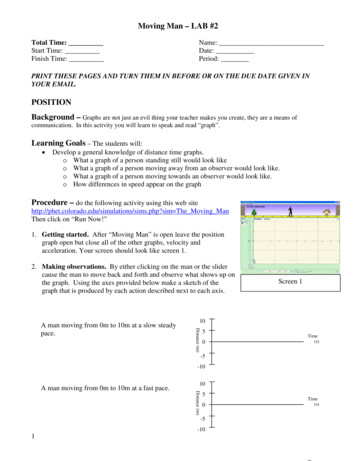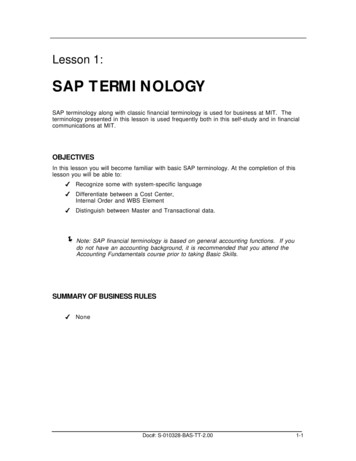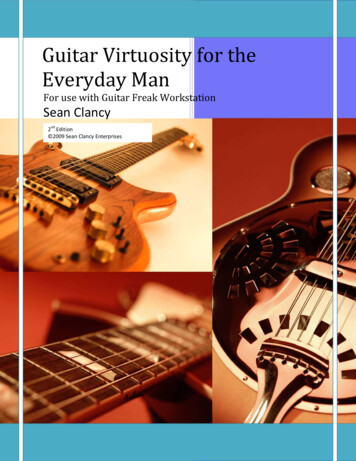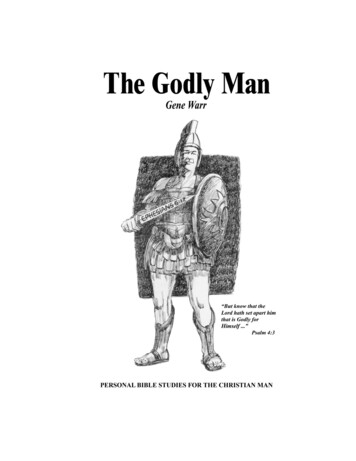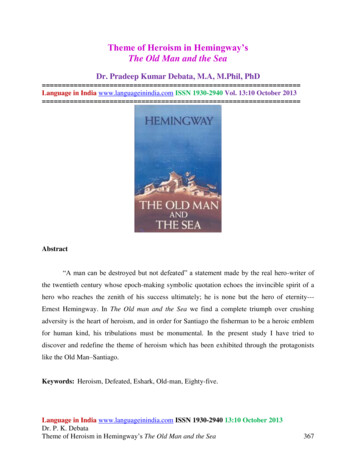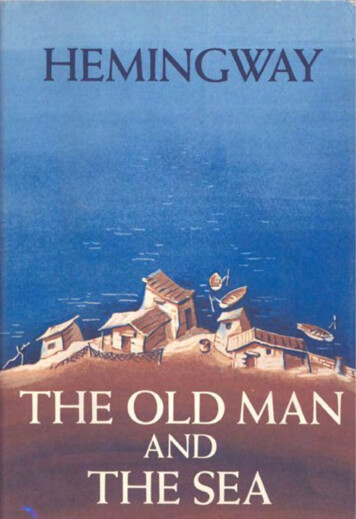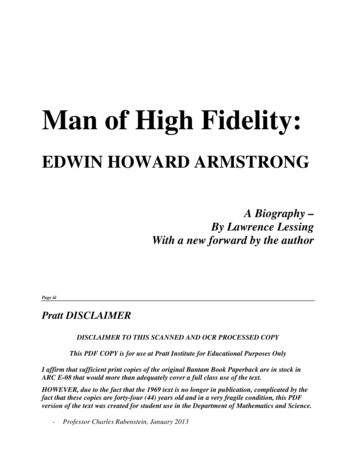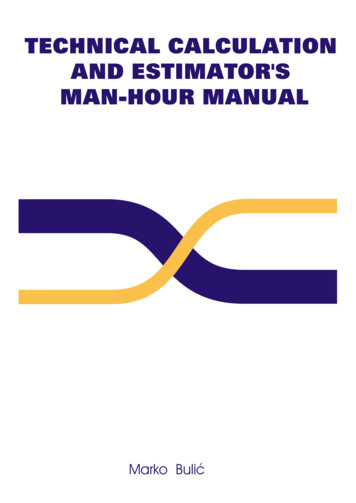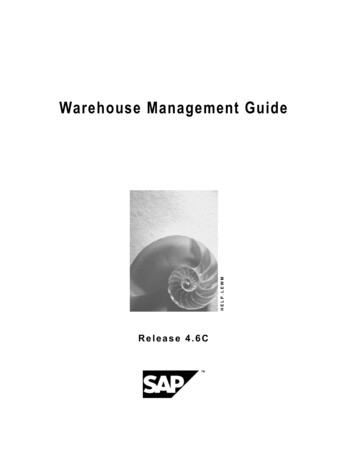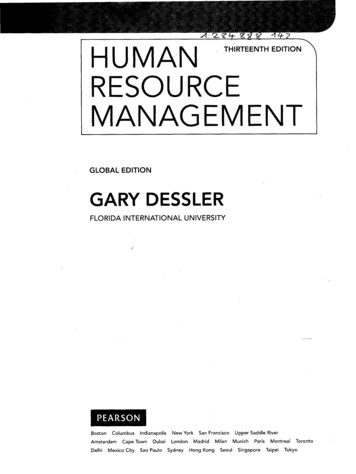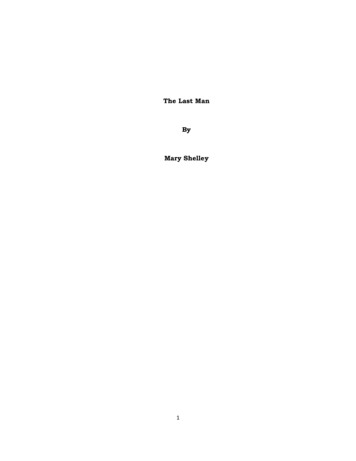
Transcription
The Last ManByMary Shelley1
VOL. I.INTRODUCTION.I VISITED Naples in the year 1818. On the 8th of December of that year, mycompanion and I crossed the Bay, to visit the antiquities which arescattered on the shores of Baiae. The translucent and shining waters of thecalm sea covered fragments of old Roman villas, which were interlaced bysea-weed, and received diamond tints from the chequering of the sun-beams;the blue and pellucid element was such as Galatea might have skimmed in hercar of mother of pearl; or Cleopatra, more fitly than the Nile, have chosenas the path of her magic ship. Though it was winter, the atmosphere seemedmore appropriate to early spring; and its genial warmth contributed toinspire those sensations of placid delight, which are the portion of everytraveller, as he lingers, loath to quit the tranquil bays and radiantpromontories of Baiae.We visited the so called Elysian Fields and Avernus: and wandered throughvarious ruined temples, baths, and classic spots; at length we entered thegloomy cavern of the Cumaean Sibyl. Our Lazzeroni bore flaring torches,which shone red, and almost dusky, in the murky subterranean passages,whose darkness thirstily surrounding them, seemed eager to imbibe more and2
more of the element of light. We passed by a natural archway, leading to asecond gallery, and enquired, if we could not enter there also. The guidespointed to the reflection of their torches on the water that paved it,leaving us to form our own conclusion; but adding it was a pity, for it ledto the Sibyl's Cave. Our curiosity and enthusiasm were excited by thiscircumstance, and we insisted upon attempting the passage. As is usuallythe case in the prosecution of such enterprizes, the difficulties decreasedon examination. We found, on each side of the humid pathway, "dry land forthe sole of the foot."At length we arrived at a large, desert, dark cavern, which the Lazzeroniassured us was the Sibyl's Cave. We were sufficiently disappointed--Yetwe examined it with care, as if its blank, rocky walls could still beartrace of celestial visitant. On one side was a small opening. Whither doesthis lead? we asked: can we enter here?--"Questo poi, no,"--said thewild looking savage, who held the torch; "you can advance but a shortdistance, and nobody visits it.""Nevertheless, I will try it," said my companion; "it may lead to the realcavern. Shall I go alone, or will you accompany me?"I signified my readiness to proceed, but our guides protested against sucha measure. With great volubility, in their native Neapolitan dialect, withwhich we were not very familiar, they told us that there were spectres,that the roof would fall in, that it was too narrow to admit us, that therewas a deep hole within, filled with water, and we might be drowned. My3
friend shortened the harangue, by taking the man's torch from him; and weproceeded alone.The passage, which at first scarcely admitted us, quickly grew narrower andlower; we were almost bent double; yet still we persisted in making our waythrough it. At length we entered a wider space, and the low roofheightened; but, as we congratulated ourselves on this change, our torchwas extinguished by a current of air, and we were left in utter darkness.The guides bring with them materials for renewing the light, but we hadnone--our only resource was to return as we came. We groped round thewidened space to find the entrance, and after a time fancied that we hadsucceeded. This proved however to be a second passage, which evidentlyascended. It terminated like the former; though something approaching to aray, we could not tell whence, shed a very doubtful twilight in the space.By degrees, our eyes grew somewhat accustomed to this dimness, and weperceived that there was no direct passage leading us further; but that itwas possible to climb one side of the cavern to a low arch at top, whichpromised a more easy path, from whence we now discovered that this lightproceeded. With considerable difficulty we scrambled up, and came toanother passage with still more of illumination, and this led to anotherascent like the former.After a succession of these, which our resolution alone permitted us tosurmount, we arrived at a wide cavern with an arched dome-like roof. Anaperture in the midst let in the light of heaven; but this was overgrownwith brambles and underwood, which acted as a veil, obscuring the day, and4
giving a solemn religious hue to the apartment. It was spacious, and nearlycircular, with a raised seat of stone, about the size of a Grecian couch,at one end. The only sign that life had been here, was the perfectsnow-white skeleton of a goat, which had probably not perceived the openingas it grazed on the hill above, and had fallen headlong. Ages perhaps hadelapsed since this catastrophe; and the ruin it had made above, had beenrepaired by the growth of vegetation during many hundred summers.The rest of the furniture of the cavern consisted of piles of leaves,fragments of bark, and a white filmy substance, resembling the inner partof the green hood which shelters the grain of the unripe Indian corn. Wewere fatigued by our struggles to attain this point, and seated ourselveson the rocky couch, while the sounds of tinkling sheep-bells, and shout ofshepherd-boy, reached us from above.At length my friend, who had taken up some of the leaves strewed about,exclaimed, "This is the Sibyl's cave; these are Sibylline leaves." Onexamination, we found that all the leaves, bark, and other substances, weretraced with written characters. What appeared to us more astonishing, wasthat these writings were expressed in various languages: some unknown to mycompanion, ancient Chaldee, and Egyptian hieroglyphics, old as thePyramids. Stranger still, some were in modern dialects, English andItalian. We could make out little by the dim light, but they seemed tocontain prophecies, detailed relations of events but lately passed; names,now well known, but of modern date; and often exclamations of exultation orwoe, of victory or defeat, were traced on their thin scant pages. This was5
certainly the Sibyl's Cave; not indeed exactly as Virgil describes it, butthe whole of this land had been so convulsed by earthquake and volcano,that the change was not wonderful, though the traces of ruin were effacedby time; and we probably owed the preservation of these leaves, to theaccident which had closed the mouth of the cavern, and the swift-growingvegetation which had rendered its sole opening impervious to the storm. Wemade a hasty selection of such of the leaves, whose writing one at least ofus could understand; and then, laden with our treasure, we bade adieu tothe dim hypaethric cavern, and after much difficulty succeeded in rejoiningour guides.During our stay at Naples, we often returned to this cave, sometimes alone,skimming the sun-lit sea, and each time added to our store. Since thatperiod, whenever the world's circumstance has not imperiously called meaway, or the temper of my mind impeded such study, I have been employed indeciphering these sacred remains. Their meaning, wondrous and eloquent, hasoften repaid my toil, soothing me in sorrow, and exciting my imagination todaring flights, through the immensity of nature and the mind of man. Forawhile my labours were not solitary; but that time is gone; and, with theselected and matchless companion of my toils, their dearest reward is alsolost to me--Di mie tenere frondi altro lavoroCredea mostrarte; e qual fero pianetaNe' nvidio insieme, o mio nobil tesoro?6
I present the public with my latest discoveries in the slight Sibyllinepages. Scattered and unconnected as they were, I have been obliged to addlinks, and model the work into a consistent form. But the main substancerests on the truths contained in these poetic rhapsodies, and the divineintuition which the Cumaean damsel obtained from heaven.I have often wondered at the subject of her verses, and at the Englishdress of the Latin poet. Sometimes I have thought, that, obscure andchaotic as they are, they owe their present form to me, their decipherer.As if we should give to another artist, the painted fragments which formthe mosaic copy of Raphael's Transfiguration in St. Peter's; he would putthem together in a form, whose mode would be fashioned by his own peculiarmind and talent. Doubtless the leaves of the Cumaean Sibyl have suffereddistortion and diminution of interest and excellence in my hands. My onlyexcuse for thus transforming them, is that they were unintelligible intheir pristine condition.My labours have cheered long hours of solitude, and taken me out of aworld, which has averted its once benignant face from me, to one glowingwith imagination and power. Will my readers ask how I could find solacefrom the narration of misery and woeful change? This is one of themysteries of our nature, which holds full sway over me, and from whoseinfluence I cannot escape. I confess, that I have not been unmoved by thedevelopment of the tale; and that I have been depressed, nay, agonized, atsome parts of the recital, which I have faithfully transcribed from mymaterials. Yet such is human nature, that the excitement of mind was dear7
to me, and that the imagination, painter of tempest and earthquake, or,worse, the stormy and ruin-fraught passions of man, softened my realsorrows and endless regrets, by clothing these fictitious ones in thatideality, which takes the mortal sting from pain.I hardly know whether this apology is necessary. For the merits of myadaptation and translation must decide how far I have well bestowed my timeand imperfect powers, in giving form and substance to the frail andattenuated Leaves of the Sibyl.8
CHAPTER I.I AM the native of a sea-surrounded nook, a cloud-enshadowed land, which,when the surface of the globe, with its shoreless ocean and tracklesscontinents, presents itself to my mind, appears only as an inconsiderablespeck in the immense whole; and yet, when balanced in the scale of mentalpower, far outweighed countries of larger extent and more numerouspopulation. So true it is, that man's mind alone was the creator of allthat was good or great to man, and that Nature herself was only his firstminister. England, seated far north in the turbid sea, now visits my dreamsin the semblance of a vast and well-manned ship, which mastered the windsand rode proudly over the waves. In my boyish days she was the universe tome. When I stood on my native hills, and saw plain and mountain stretch outto the utmost limits of my vision, speckled by the dwellings of mycountrymen, and subdued to fertility by their labours, the earth's verycentre was fixed for me in that spot, and the rest of her orb was as afable, to have forgotten which would have cost neither my imagination norunderstanding an effort.My fortunes have been, from the beginning, an exemplification of the powerthat mutability may possess over the varied tenor of man's life. Withregard to myself, this came almost by inheritance. My father was one ofthose men on whom nature had bestowed to prodigality the envied gifts ofwit and imagination, and then left his bark of life to be impelled by thesewinds, without adding reason as the rudder, or judgment as the pilot for9
the voyage. His extraction was obscure; but circumstances brought him earlyinto public notice, and his small paternal property was soon dissipated inthe splendid scene of fashion and luxury in which he was an actor. Duringthe short years of thoughtless youth, he was adored by the high-bredtriflers of the day, nor least by the youthful sovereign, who escaped fromthe intrigues of party, and the arduous duties of kingly business, to findnever-failing amusement and exhilaration of spirit in his society. Myfather's impulses, never under his own controul, perpetually led him intodifficulties from which his ingenuity alone could extricate him; and theaccumulating pile of debts of honour and of trade, which would have bent toearth any other, was supported by him with a light spirit and tamelesshilarity; while his company was so necessary at the tables and assembliesof the rich, that his derelictions were considered venial, and he himselfreceived with intoxicating flattery.This kind of popularity, like every other, is evanescent: and thedifficulties of every kind with which he had to contend, increased in afrightful ratio compared with his small means of extricating himself. Atsuch times the king, in his enthusiasm for him, would come to his relief,and then kindly take his friend to task; my father gave the best promisesfor amendment, but his social disposition, his craving for the usual dietof admiration, and more than all, the fiend of gambling, which fullypossessed him, made his good resolutions transient, his promises vain. Withthe quick sensibility peculiar to his temperament, he perceived his powerin the brilliant circle to be on the wane. The king married; and thehaughty princess of Austria, who became, as queen of England, the head of10
fashion, looked with harsh eyes on his defects, and with contempt on theaffection her royal husband entertained for him. My father felt that hisfall was near; but so far from profiting by this last calm before the stormto save himself, he sought to forget anticipated evil by making stillgreater sacrifices to the deity of pleasure, deceitful and cruel arbiter ofhis destiny.The king, who was a man of excellent dispositions, but easily led, had nowbecome a willing disciple of his imperious consort. He was induced to lookwith extreme disapprobation, and at last with distaste, on my father'simprudence and follies. It is true that his presence dissipated theseclouds; his warm-hearted frankness, brilliant sallies, and confidingdemeanour were irresistible: it was only when at a distance, while stillrenewed tales of his errors were poured into his royal friend's ear, thathe lost his influence. The queen's dextrous management was employe
Mary Shelley . 2 VOL. I. INTRODUCTION. I VISITED Naples in the year 1818. On the 8th of December of that year, my companion and I crossed the Bay, to visit the antiquities which are scattered on the shores of Baiae. The translucent and shining waters of the calm sea covered fragments of old Roman villas, which were interlaced by sea-weed, and received diamond tints from the chequering of the .File Size: 1MBPage Count: 615


